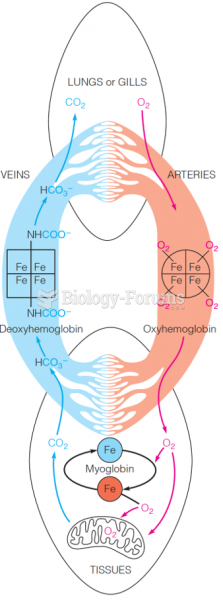|
|
|
The familiar sounds of your heart are made by the heart's valves as they open and close.
More than 34,000 trademarked medication names and more than 10,000 generic medication names are in use in the United States.
A good example of polar molecules can be understood when trying to make a cake. If water and oil are required, they will not mix together. If you put them into a measuring cup, the oil will rise to the top while the water remains on the bottom.
People with high total cholesterol have about two times the risk for heart disease as people with ideal levels.
It is believed that the Incas used anesthesia. Evidence supports the theory that shamans chewed cocoa leaves and drilled holes into the heads of patients (letting evil spirits escape), spitting into the wounds they made. The mixture of cocaine, saliva, and resin numbed the site enough to allow hours of drilling.







